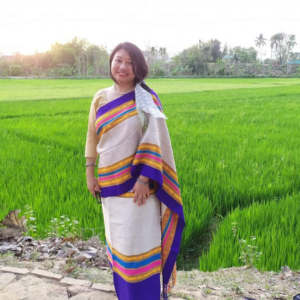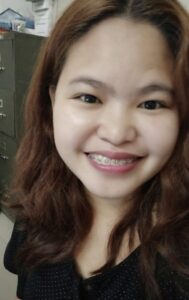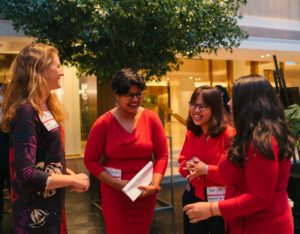
09 Aug Women leaders are paving the way for indigenous youth to become catalysts of change
On the International Day Of The World’s Indigenous Peoples, we spotlight the important work of indigenous women leaders and their allies in driving transformative change. Read two remarkable leadership journeys — Hilari Tripura, an indigenous women leader from Bangladesh, and Anne Carbon Vale, an ally to indigenous youth in the Philippines.
Learn how the works of these women leaders are paving the way for indigenous youth to become catalysts of change in young girls’ reproductive rights, education, and environmental conservation.
Hilari Tripura
Programme Coordinator at Hill Flower, Bangladesh

Hilari Tripura is a Rising Star and Wedu mentor from Khagrachhari District, Bangladesh. Khagrachhari, Bandarban, and Rangamati form the Chittagong Hill Tracts (CHT), which is home to more than 500,000 indigenous peoples in the Southeastern part of the country. Hilari’s ethnic group, Tripura, is spread across the CHT and the Tripura state in India.
As the Programme Coordinator at Hill Flower, a Rangamati-based not-for-profit organisation, Hilari is dedicated to creating safe spaces for indigenous girls to learn about their sexual and reproductive health and rights through the Our Lives, Our Health, Our Futures project. The project reaches more than 1,200 girls through 30 Girls’ Clubs across the CHT. A mentor from the indigenous community leads every Girls’ Club, which is a space for the girls to gather and learn to advocate for their rights and challenge harmful social norms that limit their development.
“When I first joined the organisation and came to meet the mentors of the Girls Club, they did not expect that I would be a woman. If you think about the Project Coordinator, a supposedly big position, everyone anticipates that they are going to be a man. So they were really surprised to see me.”
Her leadership is exemplary for the girls that she works with. But she does not want to be an exception. Hilari adds, “Through this project, I am working for the indigenous women’s right to health, although it’s a smaller part of the indigenous rights, I am working to inspire other indigenous youth. I want my work to inspire others.”
Hilari hopes that young girls she works with become a strong advocate for themselves. In her interactions with girls, she encourages them to continue their education and hone their leadership skills. Hilari says, “You should know your rights and know when you need to speak up for yourself. You don’t have to be a human rights activist or any other kind of activist to speak up for your rights.”
Anne Carbon Vale
Founder of We Lift Club, The Philippines

Anne Carbon Vale is the Founder of We Lift Club and a full-time Peacebuilder at Teach Peace Build Peace Movement in the Philippines. While she helps combat violent extremism in the country, she is also dedicated to securing the right to quality education through the Club.
She founded the Club in 2007. It’s a volunteer-based organisation that works at the intersection of education and environmental conservation. It partners with schools in remote parts of the country, which is home to indigenous students from the Dumagat, Katubanglin, Agta, and Igorot indigenous groups, among others. Through its flagship, The Hopeful Campaign, it mobilises resources like educational supplies and educational supplies, scholarships, and learning activities for the students and fosters their leadership development. But Anne’s ultimate goal is to inspire hope.
“Our aim is to motivate them [the students] not to give up. Poverty is one of the problems in the communities, and families often have to prioritise getting food on the table over sending their children to school. Even in these challenging circumstances, we want to inspire hope in them.”
Having gotten the opportunity to pursue her college education through a scholarship programme, Anne wants to make it possible for other students with limited means to reach their academic goals. The Club first started as her university-mandated Literacy Training Service, where she taught students in the Rizal Province. But she continued to work with children after finishing university.
Later when she was working on a reforestation project in the Sierra Madre mountain range, she connected with the indigenous peoples. The environmental loss is escalating in indigenous ancestral lands, including mountains, forests, riversides, and islands where many partner schools are located. This loss threatens the indigenous way of life and affects students right to learn in clean, safe and secure environments. To support the indigenous students in taking action to protect the environment, the Club also organises coastal cleanups and tree-planting activities.
After working with communities for more than 16 years, Anne has developed a nuanced way of overcoming the logistical and cultural barriers that come with working with and for indigenous students. Volunteers based in mainland Bordeus, with knowledge of both indigenous languages and Tagalog, often take on the role of intermediary. As the school partners are located in secluded regions without a mobile signal, the volunteers facilitate communication with parents, teachers, school principals, and indigenous leaders.
As an ally working for quality education for indigenous students, Anne says, “We should be an instrument to break barriers and bridge gaps between somebody’s dream and reality. Getting a quality education still remains a dream for many students, so our aim is to help them realise their goals.”
Learn more about We Lift Club on their social media on Facebook and Instagram at @weliftclub
 💌 At Wedu, At Wedu, we celebrate and nurture the unique and transformative leadership journeys of Rising Stars like Hilari and Anne. Support our mission by giving here or becoming a mentor.
💌 At Wedu, At Wedu, we celebrate and nurture the unique and transformative leadership journeys of Rising Stars like Hilari and Anne. Support our mission by giving here or becoming a mentor.


Sorry, the comment form is closed at this time.